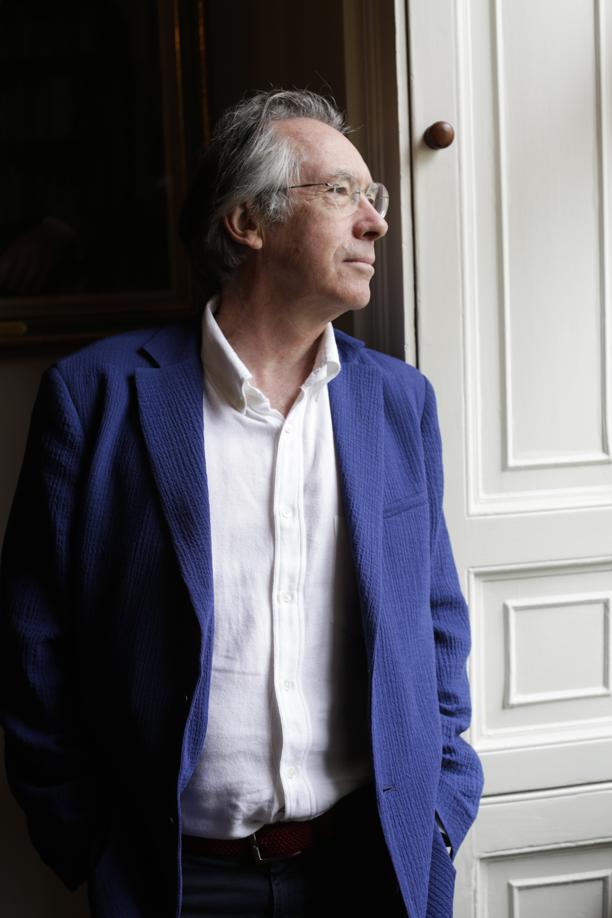
Ian McEwan is not only a best-selling and award-winning novelist (“Atonement, “Amsterdam’’), but a prolific one. He just published his 15th novel, “Nutshell,’’ which has a surprising narrator. McEwan discusses the book with author and Harvard University professor Steven Pinker at 7 p.m. on Wednesday at the First Parish Church. Tickets to the event, sponsored by the Harvard Book Store, are $26.25 and include a copy of his new book.
BOOKS: What are you reading currently?
MCEWAN: I’ve got this enduring fascination for novellas. I recently read “A Whole Life’’ by Robert Seethaler. The novella is set in a valley in the Alps and is about a man who barely leaves it his whole life. Beyond the valley, you feel the advance of modernity. It’s very clever and mesmerizing.
BOOKS: What are some of your other favorite novellas?
MCEWAN: I think “Reunion’’ by the German writer Fred Uhlman is a small masterpiece. It’s about a rather passionate friendship in 1932 between two schoolboys. The whole novella turns on the last word. You try writing that. There is a lovely American novella, “Sylvia’’ by Leonard Michaels, set in Greenwich Village around 1960. It’s the story of the most disastrous love affair you can imagine.
BOOKS: What do you find so compelling about novellas?
MCEWAN: Two central things. It demands of writers to be on their best behavior at the sentence and paragraph level. When you think of all the great novellas of the 20th century — Henry James’s “The Turn of the Screw,’’ Franz Kafka’s “The Metamorphosis,’’ Joseph Conrad’s “Heart of Darkness’’ — we are looking at those writers at their best. From a reader’s point of view, it’s very hard to hold the structure of a novel in your mind. With a novella you can feel the aesthetic nature of the book’s shape.
BOOKS: What are some of the long books you’ve loved?
MCEWAN: Joyce’s “Ulysses,’’ though there are boring stretches. I’ve immensely enjoyed Jonathan Franzen’s novels. Another one I’m reading now is Zadie Smith’s “Swing Time.’’ She’s one of those rare British writers who’s completely comfortable moving through layers of class without any condescension. I’m somewhat in awe of her.
BOOKS: What long classics have you yet to read?
MCEWAN: I haven’t read the whole of Proust, but I will get to that. I haven’t read George Eliot’s “Mill on the Floss.’’ I reread “Middlemarch’’ and was utterly captivated. In my memory it was too often broken up by authorial digressions, but they are actually superb and not as long as I remembered. You can live inside that book as you can with Thackeray’s “Vanity Fair.’’
BOOKS: Do you read nonfiction?
MCEWAN: I read vast amounts. I’ve recently been reading music books, such as Ian Bostridge’s superb account of Schubert’s “Winter Journey.’’ I’ve also been reading the conductor John Eliot Gardiner’s biography of Bach. That’s utterly absorbing.
BOOKS: What other subjects are you drawn to in nonfiction?
MCEWAN: History. I’ve been reading “History of the Ottoman Empire’’ by William Deans. I’m just rereading “Double Helix’’ by James D. Watson, an account of the discovery of DNA’s structure. It’s one of the most fascinating and wayward books on the nature of scientific discovery.
BOOKS: Which authors would you like to read more by?
MCEWAN: I’ve just read my first Anthony Trollope, “The Warden,’’ which was engrossing. I want to read more Trollope. I never had to read him in school so I come to him fresh.
BOOKS: Do you think having to read a book for school can ruin it for someone?
MCEWAN: Quite a lot of my books are set for kids in high school, and I have mixed feelings about that. I’d rather people voluntarily read my books, not have someone standing over them with a bullwhip. Yet, I have met enthusiastic, bookish, young people who ask me to sign their battered paperbacks, title pages covered in writing, the pages curling, yellow, and coffee-stained. Then I feel really touched.
AMY SUTHERLAND
Follow us on Facebook or @GlobeBiblio on Twitter.


 PREVIOUS ARTICLE
PREVIOUS ARTICLE